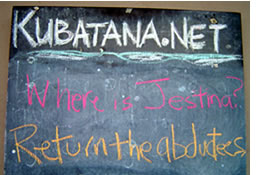Desperately seeking: A bold, new approach
Saturday, January 31st, 2009 by Amanda AtwoodI’ve been thinking about this “inclusive government,” and about the notion that that MDC had no choice – that it couldn’t risk “defying SADC,” that it had to agree to the terms of the 27 January SADC Communiqué.
One problem with that whole theory is that it gives to SADC an authority that I don’t think it deserves. Granted, some heads of certain SADC countries respect the rule of law, treat their citizens fairly and promote justice at home. But since when has SADC been an honest, reliable broker when it comes to Zimbabwe? It’s always had a bias – as evidenced by the very fact that the Zimbabwe crisis has stretched out as long as it has. And it feels like Mugabe has a case of selective sovereignty. Mr You keep your Britain and I’ll keep my Zimbabwe suddenly cares what other countries think about what he does at home? Yeah, right.
It also comes back to this question of desperation. The MDC say they’re weren’t desperate to be in government, but their actions tell a different story.
Along these lines, Dale Doré sent in these comments recently which resonated with me:
In September 2008 the MDC was pressured by Mbeki into a deeply flawed agreement. For all Mugabe’s loathing and contempt for the MDC and its leaders, there are those in the opposition who still believe that a deal with Mugabe is their only option. Instead of believing in themselves, they believe in Mugabe’s omnipotence. Instead of sticking to their democratic principles as the route to legitimate political power, they believe that power can be shared with Mugabe. Instead of believing themselves to be the true heirs of democratically-won political power, they fear that Mugabe will form a government without them. Until and unless the MDC believe in themselves and move boldly to capture the high moral and political ground – nothing will change.
Even after Mugabe illegitimately grabbed the lion’s share of power, SADC has still put their trust in him to negotiate in good faith when implementing the power-sharing agreement. Instead of fair and unbiased arbitration, Mbeki and the SADC leaders have now placed the MDC in a lose-lose situation. If the MDC pulls out of the agreement, they will look like the spoilers. If they enter the agreement, they will be completely dominated by the very forces they oppose and make them complicit in Mugabe’s dictatorship. However, our first responsibility is not to Thabo Mbeki or leaders of other countries.
We must not sign any agreement to appease Mugabe, Mbeki or SADC. Our responsibility is first and foremost to the people of Zimbabwe. Having tried our utmost, but having failed to reach agreement, we must now put aside any kind of power-sharing deal, including that which SADC has put on the table. A bold, new approach is needed.
Read more here










